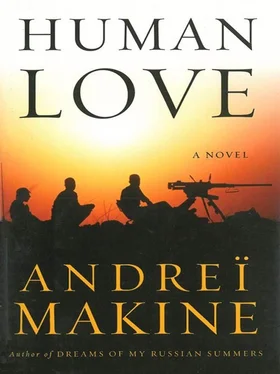Three years later, during a mass meeting in Havana, the same idea about love and revolution occurred to him: just as crude a consideration, and just as disconcertingly lucid. And yet he had meanwhile made good progress in the study of the armed struggle, of Marxist theory, and he thought he knew what women, with their beauty, their strength, and their vulnerability, could give, and could not give, a man. But the question that had troubled him in the old days remained as clear and insoluble as ever: If the revolution doesn’t change the way we love, what’s the point of all this fighting?
Motionless in the lineup of his comrades, young soldiers like himself, he was watching the vast open space crowded with the “toiling masses,” who were being warmed up by the speakers before Castro took the floor. Slogans rattled out on the wind with the slashing resonance of Spanish, the applause and shouting erupted in long, foaming waves. From his place behind the platform, Elias could see the speakers’ backs and the reverse side of two enormous banners. The sunlight was so strong that the painted figures showed through and could be recognized: Marx and Engels to the right of the rostrum, Lenin and Castro to the left. He was not listening to the harangues but noting the bizarre features of the spectacle. Unusually, the four mentors of humanity were shown full length, on the canvas of the banners: generally only their heads were portrayed. The reverse side of the canvas was punctuated with nails that held it to the framework of wooden struts. Curiously, the thought that one of the nails had been driven into Engel s’s chest and another had pierced Castro’s beard rendered the speeches both ludicrous and ambiguous. Libertad … movimiento … histórico … poder popular … The faces in the crowd smiled foolishly, as if watching a film, while the backs of the banners revealed fabric frayed at the edges.
A woman with blond hair mounted the platform, and the impression of a staged performance increased. She spoke with a strong accent, gesticulating. Elias experienced the unease that is felt when a person dear to one makes a public appearance. Especially a woman recently held in one’s arms, kissed, pleasured. An inane pride (“They’re cheering a woman IVe just slept with”) and shame, as if the two of them had suddenly exposed themselves naked.
He had known Louise Rimens for several months – a Frenchwoman from a very wealthy family who had broken with her background and “married the revolution,” as she put it. At first Elias perceived hers as a unique and exemplary life story, before learning that the agitation among the young in ‘68 had spawned hordes of apprentice rebels who were now at large in those countries where they could still fan the embers and lead lives capable of shocking their bourgeois parents. Everything Louise did in Cuba was, consciously or not, directed at an imaginary audience back in France.
Now she was calling for the flame of revolt to be spread to other continents. (“For there are no flameproof countries anywhere in the world!” Where on earth did she learn these expressions?) Her voice faltered when she mentioned Ernesto Guevara. And within the enclosed space behind the lectern her feet were arranged in a ridiculous and touching manner: her heels splayed out and her big toes pressed together. Her body was robust but not graceful. The plumpness of a young woman from a good family (plentiful food, riding, holidays in a vast country house), a young woman eager at all costs to take advantage of the benefits of her bourgeois youth in adventures at the other end of the world, among starving populations, upheavals, and struggles.
It all seemed so clear to Elias now! A little girl of twenty-five, a spoiled child, busy crafting a life story for herself. Manipulating the modeling clay that had come to hand: this Cuba in ferment, this Havana crowd drinking in her words like those of a prophet (so she believed), the enthusiastic articles she sent to a Paris newspaper and “Che,” an icon, immortal, because he had died at the right moment… And myself too, an exotic lover, the embodiment of “négritude,” a perfect feature of the whole scenario…
He had never sensed this so plainly before. So all it took was to be located behind the platform, to see the backs of the banners and the nails driven through the bodies of the revolutionaries (There, squarely in Fidel’s crotch, he noted, repressing an untoward smile), to notice Louise’s feet. Her French accent, after the harshness of the Spanish, made one think of a cabaret singer’s rhyming lyrics.
It’s playacting, he reflected, recalling how that young Cuban woman had sobbed three years earlier as she gave him the news of Ernesto’s death. Yes, it’s still the same playacting, except that I now have the enviable role of male juvenile lead in it…
Then it was as if a flood of fresh and disconcerting perceptions suddenly struck him. He reflected that the persona of the black lover, with a legendary warrior’s aura, would certainly turn out to be the heartthrob role white women would adore casting him in. And that a male model like this would attract European women of a very specific type: disaffected young middle-class women with a mania for heroic exoticism, rather plain women who would instinctively home in on that sought-after male, the black man they believe eager to possess a white woman… He suddenly realized that Louise was very similar to his fathers companion, the Belgian woman who had abandoned, or rather betrayed, them in the Congo. And that this Frenchwoman, too, was free to leave whenever the fancy took her. And that he, the black lover, would disappear from her life as soon as the curtain fell. And that in truth she despised this crowd of Cubans, because instead of flying to Che s rescue, they got married, grilled fish in stinking oil, dreamed of buying cars… And that she was consuming the revolution just as, in Europe, she would have consumed food and clothes, and that for her, he himself, his black skin, his body, his genitals, were also consumer goods…
Castros voice broke in on this tumble of bitter thoughts. The orator was speaking with somewhat mournful sincerity, with vehement and at the same time melancholy conviction. The conviction of someone who no longer believes, but who wants at all costs to be believed, Elias would reflect years later.
As for himself, he wanted to hold on to his faith at all costs. That ancient, still childlike hope of seeing a world where it would be impossible to leave a woman to die with a broken collarbone, or to gun a man down, almost absent-mindedly, between two drags on a cigarette.
Toward the end of the speech he felt a light tickle on his back. A whisper brushed his ear: Til be waiting for you at my place. Try to get away” Louise had managed to insinuate herself in between the ranks of the soldiers. Without seeing her, Elias was aware of that great child’s gleeful excitement, her passion for clandestine adventures and secret rendezvous. He looked at his watch (Castro had been speaking for more than two hours) and noted that, in exalting the society of the future, at no point had the orator referred to the love between two human beings.
That evening at Louise’s place he was back again in the masquerade of conspiracy, the falseness of which he now perceived so clearly. A warrior under threat (himself) meets up with his pasionaria (her) in the middle of a hostile country, in an unknown city. That must have been how Louise mythologized their nights together. She opened the door and flung her arms about him as if they had not seen one another for months, as if he had had to cross minefields and pass through bursts of gunfire. He wanted to tell her he had just strolled whistling out of the barracks, and the greatest danger he had been in during the past few months had been that of falling overboard from an inflatable craft during landing exercises. And in that neighborhood everyone was quietly getting on with frying fish… She knew all this but simply did not want to destroy the illusion.
Читать дальше









